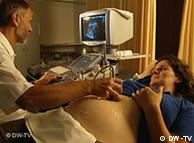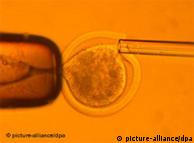Source
ETHICS | 08.03.2011
German Ethics Council votes in favor of test-tube embryo screening
The German Ethics Council on Tuesday voted in favor of allowing doctors to screen test-tube embryos for genetic defects, before parliament debates proposed legislation on the matter next week.
The Council, which serves to make independent recommendations to the German parliament and government, narrowly voted to recommend that parliament allow pre-implantation genetic diagnosis (PGD) in cases where potential parents are predispositioned to miscarry or pass along serious genetic disorders.
Of the Council’s 26 members – composed of doctors, scientists, lawyers, philosophers, and theologians – 13 voted for limited use of PGD. Eleven members voted against it.
PGD has
been the subject of hot debate in Germany since June of last year, when the Federal Court of Justice ruled that the formerly illegal practice should be allowed in some cases. Concerned that PGD could be a first step towards eugenics, many conservative politicians, including Chancellor Angela Merkel, have called for a ban.
 Conservative politicians say women should wait until they are pregnant for fetal genetic screening
Conservative politicians say women should wait until they are pregnant for fetal genetic screening
Ethics Council Vice-Chair and Catholic theologian Eberhard Schockenhoff expressed surprise at the council’s vote, after nearly two-thirds of the Council advocated allowing genetic screening in 2003 – and with much less strict limitations.
A ‘historic first’
In its nearly 110-page review of the issue, the Council expressed concern that the abuse of PGD could lead “for the first time in reproductive history to genetic selection from several embryos before the establishment of a pregnancy.”
Council member and Protestant bishop Wolfgang Huber said he objected to PGD because it could pose the possibility of “discarding a human life due to undesired traits.”
However, the Council’s 13 advocates of PGD said that in cases of serious genetic defects it was more morally acceptable to terminate artificially inseminated embryos outside the uterus than to have potential mothers abort implanted fetuses. Abortion remains a legal option in Germany for potential mothers of children with genetic disorders.
The Council’s genetic-screening advocates stressed that the procedure should only be used in cases where the prospective parents carried a strong risk of passing on hereditary disorders that could lead to grave illness or disability.
Church condemns PGD
 Huber said PGD threatened human dignity and the right to life
Huber said PGD threatened human dignity and the right to life
The German Bishops’ Conference came out against the Council’s vote Tuesday, with Bishop Anton Losinger saying pre-implantation screening was a “massive violation of the word and spirit of Germany’s Basic Law and embryo protection law.”
“What’s being achieved here is an ethical breach, because the human embryo is an embryonic human from the moment when egg and sperm come together,” Losinger said.
Germany’s Justice Minister Sabine Leutheusser-Schnarrenberger meanwhile welcomed the Ethic Council’s decision, adding that the Council’s division over the matter represented the need for an “open discussion [in parliament] without pressure to toe party lines.”
The justice minister herself came out in favor of pre-implantation screening under defined circumstances: “Especially couples with high genetic risk factors need a way to fulfill their desire for children together.”
Parliamentary debate
Next week, Germany’s parliament is set to read three pieces of proposed legislation on PGD: One out-and-out ban and two proposals to allow screening under certain circumstances.
The ban proposal, supported by a group of parliamentarians including former Health Minister Ulla Schmidt, claims that PGD threatens human dignity, as well as the right to life and gender equality. They argue that it is not up to humans to decide which life may come into existence and which may not.
A second proposal, put forth by Christian Democrat Peter Hintze and Free Democrat Ulrike Flach, would allow the use of PGD in cases where potential parents are aware of hereditary risks or where there is the threat of stillbirths or miscarriages. Hintze and Flach claim PGD to be a more humane alternative to tests on fetuses and abortion.
The third bill, drafted by a group including Bundestag President Norbert Lammert, would allow PGD in cases of hereditary risks or potential pregnancy complications – but only as determined on a case-by-case basis by an ethics commission.
Author: David Levitz (AFP, KNA, dpa)
Editor: Rob Turner

